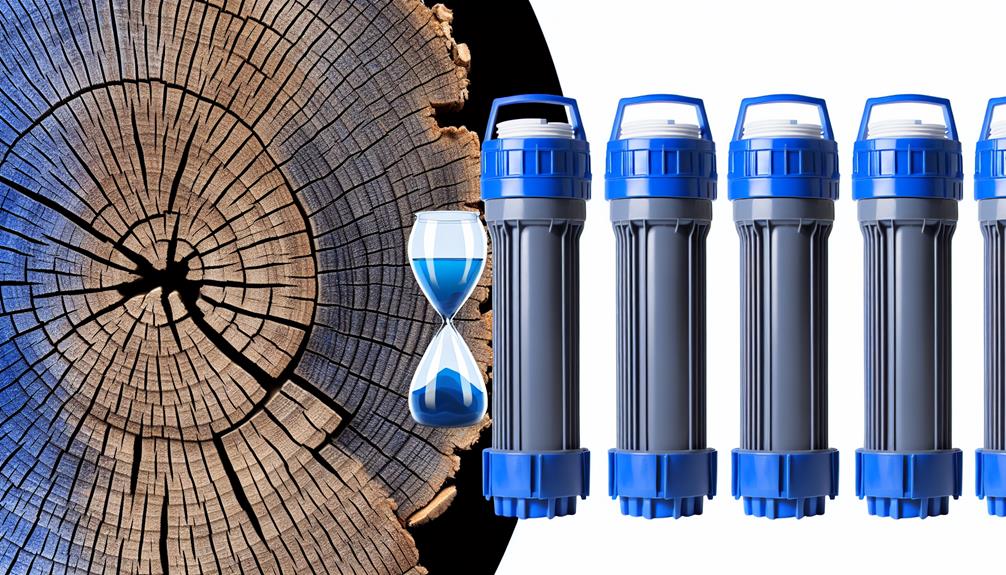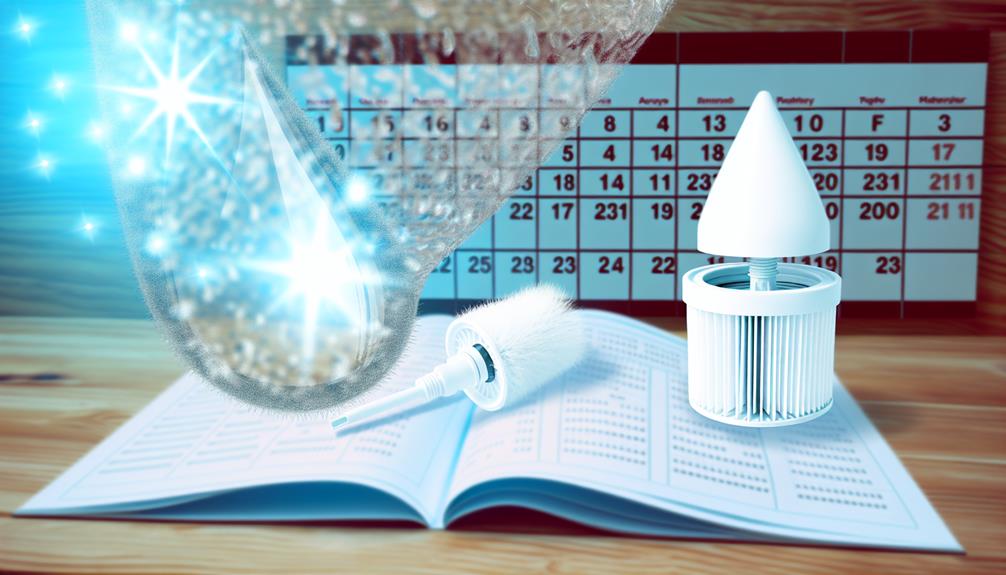You've probably noticed how your morning cup of coffee tastes better when you've just replaced the water filter; the difference is clear and undeniable. But while you're aware that changing the filter is important, you may not know what else you can do to maximize its lifespan.
Proper maintenance goes beyond the occasional swap of cartridges; it encompasses a variety of practices that can significantly extend the period between replacements. From monitoring your water pressure to understanding the nuances of your local water quality, there are several steps you can take to ensure your filter works optimally for longer.
But what are these steps, and how exactly do they impact the intricate components of your water filtration system? Stay with me, and let's explore how you can not only safeguard your investment but also continue to enjoy that crisp taste of clean water every day.
Regular Filter Replacements
To ensure optimal performance of your water filtration system, you should replace the filters every six months or according to the manufacturer's guidelines. Regular cleaning and filter replacement are critical for maintaining the efficiency of your system. Over time, filters trap impurities and contaminants, which can lead to a reduction in system effectiveness.
These filters need replacement every six months to prevent accumulated impurities from clogging the system. Follow the manufacturer's guidelines for your specific water filtration unit to maintain optimal functionality. By adhering to these recommendations, you're not only ensuring that your water remains clean but also extending the lifespan of the entire system.
System Cleaning Guidelines
While regular filter replacements are essential, proper cleaning of your water filtration system also plays a crucial role in extending its longevity and ensuring peak performance. Regular maintenance is fundamental to prevent the build-up of contaminants that can lead to clogged filters and diminished efficacy.
To start, disconnect your filter system and disassemble the components. Focus on the filter housing; this is often where debris accumulates. Use a soft brush or cloth to gently remove any sediment. For disinfection, a diluted bleach solution can be effective, but ensure it's suitable for your specific filter types and doesn't damage the components.
Rinse the housing thoroughly to eliminate any cleaning agent residue. Before reassembly, inspect each part to determine if anything needs replacement. Remember, the goal is to ensure consistent water quality, and compromised parts can undermine this objective.
After cleaning, reassemble the unit, ensuring all seals are tight to prevent leaks. Run water through the system for several minutes to clear any residual cleaner. By adhering to these technical guidelines and giving proper care to your water filter system, you'll extend the lifespan and maintain high-performance standards.
Monitoring Water Pressure
Regularly checking your water filter's pressure with a gauge ensures the system operates within its designated parameters, preventing strain or damage due to incorrect pressure levels. Efficient water flow is dependent on maintaining the proper water pressure, which can be precisely monitored using a pressure gauge. This not only maintains the integrity of your water filtration system but also ensures a consistent flow rate, essential for effective filtration and water usage.
To enhance your understanding, consider these key points:
- Periodic Monitoring: Regularly maintaining your water filter's pressure is critical. Check the pressure at least once a month to ensure it aligns with the system's specifications.
- Pressure Adjustments: If you discover low water pressure or high pressure, it may be necessary to install a pressure regulator or consult a professional to adjust the pressure to the optimal range.
- Impact on Lifespan: Maintaining proper water pressure is integral to preserving the lifespan of your water filtration system. It prevents undue stress on components, reducing wear and tear from varying water flow and volume of water passing through the system.
Addressing Water Quality
Having established the importance of monitoring water pressure for your filter's efficiency, let's now focus on the critical role that addressing water quality plays in extending the system's lifespan.
Regular assessments of water quality are paramount. Contaminants, if unchecked, can compromise your filter's ability to provide safe drinking water. By understanding the quality of the water entering your system, you can anticipate when to replace the filters, thereby preventing the accumulation of impurities and contaminants.
Ensuring clean and safe drinking water hinges on removing impurities effectively. This requires a proactive approach to maintenance. Follow the manufacturer's guidelines for system cleaning, and consider flushing the system periodically to prevent sediment, minerals, and bacteria from building up. These substances can shorten the filter's life by clogging or corroding its components.
Additionally, professional maintenance by certified technicians should occur at least once a year. This can reveal any underlying issues affecting water quality that may not be apparent to you. They can also advise on supplemental measures such as water softeners or pre-filters to address specific problems like hard water, further safeguarding your system's efficiency and durability.
Scheduled Professional Maintenance
To maintain your water filtration system's peak performance and extend its life, it's critical to schedule annual maintenance with certified technicians. This scheduled professional maintenance isn't just a cursory glance over your system; it involves a thorough and precise examination to ensure every part of your water filter is functioning as intended.
Here's why this step is non-negotiable for your filtration system's longevity and efficiency:
- Complete System Inspection: Technicians will meticulously inspect your filtration system, pinpointing any wear and tear or potential issues that could compromise quality and performance.
- Proper Cleaning and Servicing: Proper cleaning and replacement of filters are essential. Manufacturers provide specific guidelines on how to clean and maintain each component for optimal operation.
- Preventative Care: By identifying and addressing issues early, professionals prevent minor problems from escalating into major malfunctions, thus extending the lifespan of your water filter.

